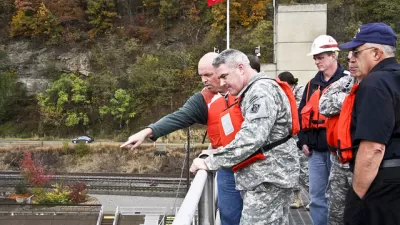A powerful lobby is more in interested in protecting its monopoly than lessening congestion and pollution.

"For many Americans, the experience of driving on a coastal highway like Interstate 5 in California can be a nightmare of dodging massive trucks hauling cargo between US cities," reports Erik Olsen.
According to Olsen, only 2 percent of domestic freight moving among the Lower 48 states moves by sea, despite the fact that about half the population lives near the coast.
The reason so much freight moves on the nation's roadways is the subject of Olsen's article, and credit goes to the Jones Act. The Jones Act, passed shortly after World War I, "preserves a monopoly for US-built, owned and operated ships to transport goods between US ports."
According to Olsen, the law was designed to protect American shipbuilding and "ensure that the US had ample ships to conduct international trade." The law didn't manage to protect the industry, however, and now "there are some 171 privately-owned US flagged ships today. Just 93 of them are Jones Act-eligible."
Thus, the consequences of the Jones Act in 2017 include higher costs for consumer goods as well as more freight on trucks. The latter, according to Olsen, "significantly increasing highways congestion, intensifying air pollution and further degrading the country’s infrastructure."
Olsen provides additional details about the consequences of the Jones Act, and discusses the business interests that have made the law virtually impossible to overturn.
FULL STORY: An arcane American law protected by powerful interests is causing insane traffic jams

Alabama: Trump Terminates Settlements for Black Communities Harmed By Raw Sewage
Trump deemed the landmark civil rights agreement “illegal DEI and environmental justice policy.”

Study: Maui’s Plan to Convert Vacation Rentals to Long-Term Housing Could Cause Nearly $1 Billion Economic Loss
The plan would reduce visitor accommodation by 25% resulting in 1,900 jobs lost.

Planetizen Federal Action Tracker
A weekly monitor of how Trump’s orders and actions are impacting planners and planning in America.

Wind Energy on the Rise Despite Federal Policy Reversal
The Trump administration is revoking federal support for renewable energy, but demand for new projects continues unabated.

Passengers Flock to Caltrain After Electrification
The new electric trains are running faster and more reliably, leading to strong ridership growth on the Bay Area rail system.

Texas Churches Rally Behind ‘Yes in God’s Back Yard’ Legislation
Religious leaders want the state to reduce zoning regulations to streamline leasing church-owned land to housing developers.
Urban Design for Planners 1: Software Tools
This six-course series explores essential urban design concepts using open source software and equips planners with the tools they need to participate fully in the urban design process.
Planning for Universal Design
Learn the tools for implementing Universal Design in planning regulations.
Caltrans
Smith Gee Studio
Institute for Housing and Urban Development Studies (IHS)
City of Grandview
Harvard GSD Executive Education
Toledo-Lucas County Plan Commissions
Salt Lake City
NYU Wagner Graduate School of Public Service




























